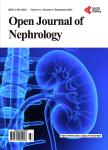Drug-Induced Acute Kidney Injury in Diabetes Mellitus
Drug-Induced Acute Kidney Injury in Diabetes Mellitus作者机构:Department of Medicine A Charles Nicolle Hospital Tunis Tunisia Faculty of Medicine University of Tunis El Manar Tunis Tunisia Laboratory of Renal Pathology LR00SP01 Charles Nicolle Hospital Tunis Tunisia
出 版 物:《Open Journal of Nephrology》 (肾脏病(英文))
年 卷 期:2016年第6卷第4期
页 面:176-187页
学科分类:1002[医学-临床医学] 100210[医学-外科学(含:普外、骨外、泌尿外、胸心外、神外、整形、烧伤、野战外)] 10[医学]
主 题:Renal Failure Nephrotoxicity Drugs
摘 要:Background: Drug-induced acute kidney injury is a common situation in clinical practice. Many treatments are involved and they are even more aggressive when associated with a predisposing factor such as diabetes. We aimed to investigate clinical features of acute drug-induced kidney injury in diabetics in order to clarify renal prognosis. Methods: This was a descriptive and analytical retrospective study including diabetics who presented drug-induced acute kidney injury, conducted in our department during the period from 1986 to 2015. Acute kidney injury was classified according to Kidney Disease Improving Global Outcomes criteria. We analyzed medical records of patients. Results: 31 patients were included with mean age of 65.41 years and gender ratio M/F at 0.93. Diabetes was type 2 in 97% of cases. Mean previous creatinine clearance was 39.33 ml/min/1.73 m2. Drugs involved were blockers of renin-angiotensin system (35%), aminoglycosides (16%), non-steroidal anti-inflammatory (16%), diuretics (13%), lipid-lowering agents (10%), rifampicin (6%) and ifosfamide (3%). Extracellular dehydration was present in nine cases (29%). Main drug combinations were with diuretics in 16 cases (52%) and with ACE inhibitor or ARB in eight cases (26%). Oligo anuria was observed in 5 cases (16%). Proteinuria with urine strips was objectified in 25 cases (81%). Acute kidney injury was grade 3 in 24 cases (77%), grade 2 in three cases (10%) and grade 1 in four cases (13%). Renal survival at 102 months was 57%. Identified renal prognosis factors were serum phosphorus 1.47 mmol/l (p = 0.01), proteinuria at urine strips (p = 0.042), dehydration (p = 0.013), oral antidiabetic treatment (p = 0.038), intravenous rehydration (p = 0.021) and insulin (p = 0.006). Conclusion: Drug-induced acute kidney injury is potentially serious in diabetics. Prevention is essential to improve the prognosis of this renal damage.



